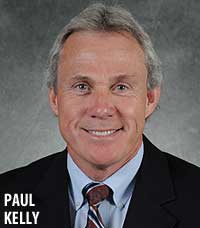 Before the ink had dried on his multi-million-dollar contract, Paul V. Kelly knew he had a problem on his hands.
Before the ink had dried on his multi-million-dollar contract, Paul V. Kelly knew he had a problem on his hands.
As the new head of the National Hockey League Players’ Association, Kelly was settling into his office in Toronto, ready to assume control of an organization in turmoil. That’s when he discovered the very players he had been hired to represent had gone behind his back and surreptitiously approved a new constitution.
The result was a revamped organizational structure that pretty much gutted the highly coveted job Kelly had been awarded over more than 500 other candidates in the fall of 2007.
His dream job was suddenly a nightmare.
“It didn’t take a brain surgeon to see that this was an unworkable structure,” Kelly said in his first extensive interview on the subject. “It was destined to fail. And it did.”
He says the new constitution was prompted by the actions of his predecessor, Ted Saskin, who departed amid allegations that he was secretly reading player emails and improperly fattening his paycheck.
Though Kelly declines to discuss the finer details of how things fell apart for him, he says the structure that the players adopted instituted a number of helmet-scratching fail-safes that, in the end, proved unworkable.
Under the new plan, the players could axe Kelly with little notice and without permitting him to be heard; a multitude of committees were appointed that were all given a say in how things should play out; and Kelly was not allowed to hire or fire his own general counsel.
“There were too many power centers and too many people offering advice to hockey players,” Kelly says. “What that union needed at the time was a leader who had the trust of the players and who didn’t have all of these people second-guessing him and critiquing his every move.”
Soon, multiple media outlets were reporting that Kelly’s GC was “hacking away” at his job, badmouthing him to the players and advocating for his dismissal.
“I paid a visit to a lawyer in Toronto, who is supposedly an expert in organizational structures, and he agreed with me that it was ridiculous,” he recalls. “You needed some level of autonomy and control, and when I was there I didn’t have it.”
Every time Kelly suggested changing the dysfunctional set-up, he was met with resistance and painted as weak and conciliatory, he says.
This from a former assistant U.S. attorney who prosecuted the Charlestown “Code of Silence” murder case and who burst on the hockey scene in the 1990s when he indicted one of his predecessors, Alan Eagleson, on fraud and embezzlement charges.
“They couldn’t digest the notion that you could take tough positions and advocate hard for causes, and at the same time be civil and professional with your adversaries,” says Kelly, a former Ropes & Gray and Foley Hoag lawyer. “My view of it was that when it came time for the NHL players to need a strict and staunch advocate, I could fight as hard as anyone. But at the end of the day, when we were talking about building new events and getting better television and dealing with some of the safety issues in our sport, I was working very constructively with the league.”
The end for Kelly came in 2009 during an all-nighter in Chicago with the newly created executive board.
“It took the vote of 30 teams to put me in place,” he says, “[and] a 4 a.m. vote by a couple of outside board members to get rid of me.”
But the real salt in the wound was still to come. Within a month of his high-profile departure, which stunned his colleagues back home, the NHLPA disavowed the constitution and replaced it with a structure similar to the one in place before Kelly’s arrival.
“If I had, as the executive director, the constitutional structure that is currently in place, I’d still be there,” he says. “That’s frustrating and disappointing.”
After taking time off to clear his head, Kelly took a job with College Hockey, Inc., the educational and promotional arm of NCAA Division I men’s hockey.
Then, five years after his last lawyering gig — at the Boston firm he co-founded, Kelly, Libby & Hoopes — the 57-year-old Newton native decided it was time to return to practicing law.
He joined the Boston office of Jackson Lewis, in the collegiate and professional sports industry group. He also handles white-collar cases.
Though he admits the firing still stings, he says he likely would have taken the NHLPA job even if he had known what he was getting into at the time.
“Since I’m not the kind of person who runs away from challenges, I probably would’ve concluded I could live under the constitution for a year or two until I could convince people of the wisdom of getting it changed,” he says. “That obviously didn’t work out.”
 New England Biz Law Update
New England Biz Law Update
